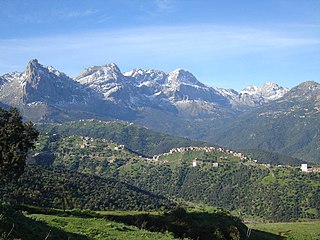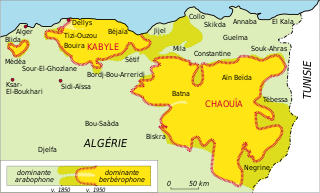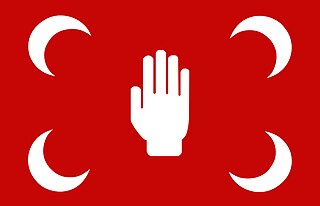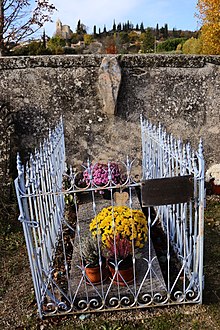
Kabylia or Kabylie is a mountainous coastal region in northern Algeria and the homeland of the Kabyle people. It is part of the Tell Atlas mountain range and is located at the edge of the Mediterranean Sea.

Kabyle or Kabylian is a Berber language (tamazight) spoken by the Kabyle people in the north and northeast of Algeria. It is spoken primarily in Kabylia, east of the capital Algiers and in Algiers itself, but also by various groups near Blida, such as the Beni Salah and Beni Bou Yaqob.(extinct?)

Lalla Fatma N'Soumer was an Algerian anti-colonial leader during 1849–1857 of the French conquest of Algeria and subsequent Pacification of Algeria. She led several battles against the French forces, until her capture in July 1857. She was imprisoned until her death six years later. She is an Algerian national hero.

The Chaoui people or Shawia are a Berber ethnic group native to the Aurès region in northeastern Algeria which spans Batna and Khenchla, Oum El Bouaghi provinces located in and surrounded by the Aurès Mountains.

Jean el Mouhouv Amrouche was an Algerian francophone writer, poet and journalist.

Hamid Cheriet, better known by his stage name Idir, was a Kabyle Algerian singer-songwriter and musician. Referred to as the "King of Amazigh music", he is regarded as one of the most significant modern day figures in Algerian and Amazigh culture, history, and struggle.

The Berber Spring was a period of political protest and civil activism in 1980, claiming recognition of the Berber identity and language in Algeria, with events mainly taking place in Kabylia and Algiers.

The Kabyle people are a Berber ethnic group indigenous to Kabylia in the north of Algeria, spread across the Atlas Mountains, 160 kilometres (100 mi) east of Algiers. They represent the largest Berber population of Algeria and the second largest in North Africa.
Marguerite-Fadhma Aït Mansour Amrouche was a poet and folksinger.

Mouloud Mammeri was an Algerian writer, anthropologist and linguist.
Mohand Arav Bessaoud was a Kabyle Algerian writer and activist. He was described as the spiritual father of Berberism, and a strong supporter of the Amazigh culture.
Académie Berbère d'Échange et de Recherches Culturels, usually shortened to Académie Berbère or the Berber Academy was a Paris-based Kabyle cultural association formed in 1966 and officially authorized in March 1967 with the objective of raising Berber consciousness. The association was renamed Agraw Imazighen in Tamazight in 1969.

Igawawen or Gawawa, mostly known as Zwawa were a group of Kabyle tribes inhabiting the Djurdjura mountains, Greater Kabylia, in Algeria, whose most famous and strongest confederations were those of the Aït Betrun, the Aït Iraten, and the Aït Mengellat, and are divided into various tribes, and the tribes themselves are divided into many villages. The Zouaoua are a branch of the Kutama tribe of the Baranis Berbers.

The Raḥmâniyya is an Algerian Sufi order founded by Kabyle religious scholar Muḥammad ibn ʿAbd al-Raḥman al-Azhari Bu Qabrayn in the 1770s. It was initially a branch of the Khalwatîya established in Kabylia region. However, its membership grew unwaveringly elsewhere in Algeria and in North Africa.

Houria Aïchi is an Algerian Berber singer of chaoui music. Aïchi sings songs that she learnt in her childhood, accompanied by bendir.
Farid Ali was an Algerian singer.

Slimane Azem was an Algerian singer and poet, born in Agouni Gueghrane ,that composed hundreds of songs in more than 40 years of artistic life. A great connoisseur and admirer of the poet Si Mohand, Slimane Azem included in his songs different isefra by this author.
Karima Dirèche is a French Algerian historian specialising in the contemporary history of the Maghreb. From September 2013 to August 2017, she has been the director of the Institute for Research on the Contemporary Maghreb in Tunis.

Tassadit Yacine-Titouh is an Algerian anthropologist specialising in Berber culture.
Si Amar U Said Boulifa was an Algerian Kabyle Berberologist and teacher.















